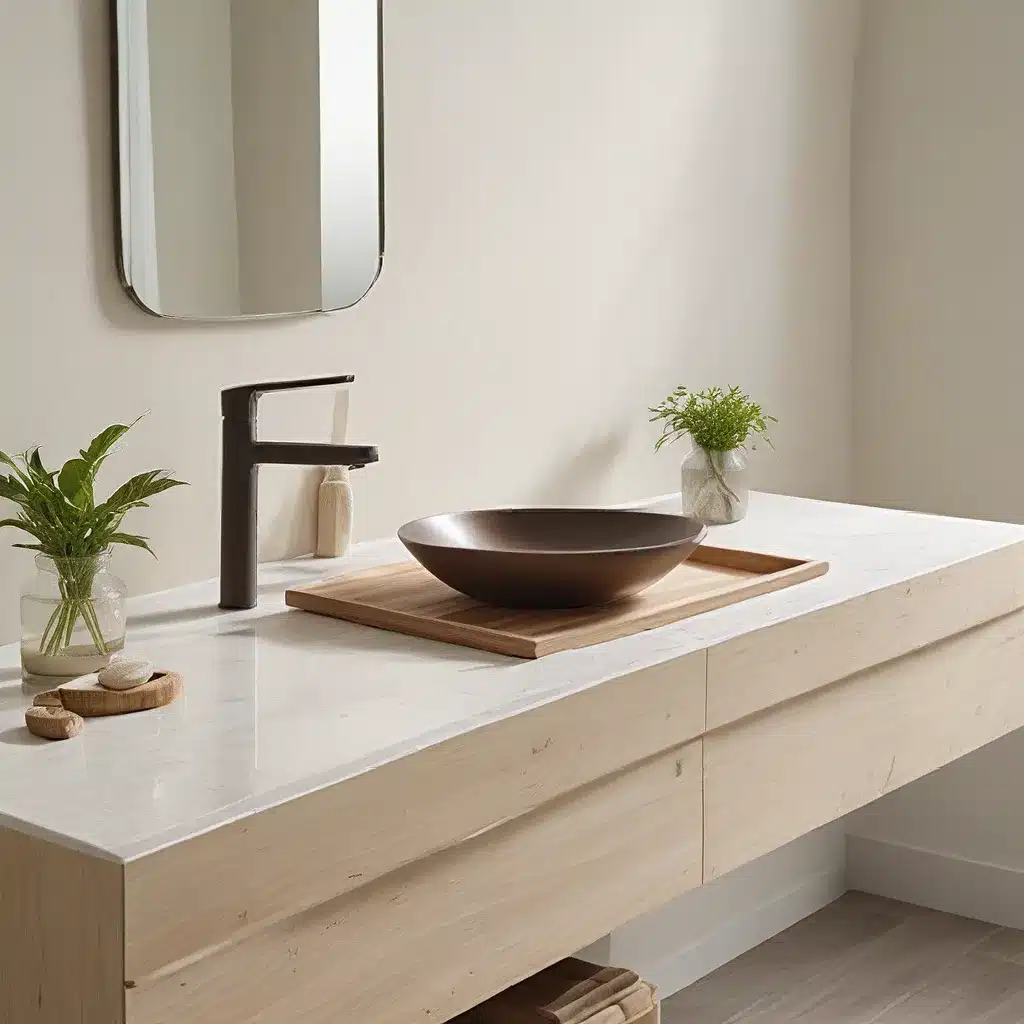
The Rise of Sustainable Bathroom Fixtures
In the ever-evolving world of interior design, the bathroom has emerged as a crucial space where homeowners and designers alike are seeking more eco-friendly and sustainable solutions. As the demand for environmentally conscious choices grows, the spotlight has shifted to the humble but essential washbasin – a fixture that can significantly impact the overall environmental footprint of a bathroom.
Traditionally, conventional sinks made from materials like porcelain or stainless steel have dominated the market. However, with heightened awareness of the need for sustainable practices, homeowners and designers are now exploring a diverse range of alternative materials and innovative design approaches that prioritize both form and function while minimizing their environmental impact.
Eco-Friendly Washbasin Materials
One of the primary drivers of the sustainable bathroom movement is the exploration of alternative materials for washbasins. These materials not only offer unique aesthetic appeal but also boast impressive eco-friendly credentials.
Natural Stone
Natural stone, such as marble, granite, or soapstone, has gained popularity as a sustainable option for washbasins. These materials are not only visually stunning but also highly durable, ensuring a long lifespan. Moreover, natural stone is a naturally occurring material that can be responsibly sourced and processed, making it a more environmentally conscious choice.
Reclaimed Wood
The circular economy has given rise to the increasing use of reclaimed wood in bathroom design, including the creation of unique and rustic-inspired washbasins. By repurposing salvaged timber from old buildings or furniture, designers and homeowners can reduce waste and contribute to a more sustainable bathroom ecosystem.
Composite Materials
Innovative composite materials, such as recycled glass, quartz, or even recycled paper, are emerging as eco-friendly alternatives to traditional washbasin options. These materials often boast impressive durability, low maintenance requirements, and a reduced environmental footprint compared to their conventional counterparts.
Vessel Sinks
The rise of vessel sinks, where the basin is visually separated from the countertop, has opened up new avenues for sustainable design. These standalone sinks can be crafted from a variety of materials, including the aforementioned natural stone, reclaimed wood, and composite options, allowing for greater design flexibility and a more personalized bathroom aesthetic.
Sustainable Installation and Maintenance
Embracing eco-friendly washbasin materials is only the first step in creating a sustainable bathroom. The installation and long-term maintenance of these fixtures also play a crucial role in minimizing their environmental impact.
Water-Efficient Faucets
Pairing eco-friendly washbasins with water-efficient faucets can further enhance the sustainability of a bathroom. Advanced faucet technologies, such as low-flow aerators or sensor-activated mechanisms, can significantly reduce water consumption without compromising functionality or user experience.
Maintenance and Cleaning
Sustainable washbasins often require minimal maintenance, reducing the need for harsh cleaning chemicals that can be detrimental to the environment. Many natural stone or composite materials can be easily wiped down with a damp cloth and mild, eco-friendly cleaners, ensuring the longevity of the fixture while maintaining a clean and hygienic bathroom.
Designing for the Future
As homeowners and designers continue to prioritize sustainability in bathroom design, the selection of washbasins has become a critical component of the overall planning process. By exploring the diverse range of eco-friendly materials and design options available, they can create bathroom spaces that not only enhance the aesthetic appeal but also minimize the environmental impact.
Integrating Sustainability into Bathroom Design
When planning a bathroom renovation or new construction, it is essential to consider sustainability as a guiding principle. This may involve researching and comparing the environmental credentials of various washbasin materials, as well as exploring innovative installation and maintenance strategies that align with sustainable practices.
Design trends in the bathroom industry are increasingly reflecting this shift towards eco-consciousness, with designers and manufacturers showcasing a wide array of sustainable options to cater to the growing consumer demand.
The Benefits of Sustainable Washbasins
Embracing eco-friendly washbasins can bring numerous benefits to both homeowners and the environment. These include:
- Reduced environmental impact through the use of renewable or recycled materials
- Lower water consumption when paired with water-efficient faucets
- Decreased reliance on harsh cleaning chemicals, promoting a healthier indoor environment
- Potential cost savings in the long run due to the durability and low maintenance requirements of sustainable washbasin materials
- Increased resale value of a property, as eco-friendly features become more sought-after by homebuyers
Conclusion: A Future-Focused Bathroom
As the demand for sustainable living continues to rise, the bathroom has become a crucial battleground in the fight for a greener future. By rethinking the traditional approach to washbasin design and embracing eco-friendly alternatives, homeowners and designers can play a pivotal role in shaping a more environmentally conscious built environment.
Navigating the diverse landscape of sustainable washbasin options may seem daunting, but with the right information and a focus on long-term value, the journey towards a more sustainable bathroom can be both rewarding and impactful. By making informed choices and prioritizing eco-friendly solutions, we can create bathrooms that not only meet our aesthetic and functional needs but also contribute to a more sustainable future.
Visit washbasinfactory.com to explore our wide selection of eco-friendly washbasin options and discover how you can incorporate sustainable design into your next bathroom project.

